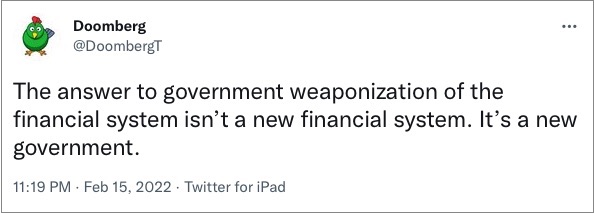The restart of history
By Mark Hurst • February 24, 2022
A video clip from CNN today shows a strange juxtaposition: first, the camera sweeps across the rooftops of Kyiv, as air raid sirens echo across the city. Then, suddenly, the feed cuts to a commercial for Applebee’s. “A Little Bit of Chicken Fried,” the on-screen text reads, superimposed above chicken nuggets drizzled with sugary orange glop. The 19-second video already has millions of views on Twitter:

I don’t mean to criticize CNN or Applebee’s specifically, as the news channel and advertiser could easily have been switched out for dozens or hundreds of others. Instead, I’m pointing out the dissonance between two worldviews presented by the clip. In the first, we see a deadly conflict born out of politics, economics, and history. In the second, a vapid set of images showing fully technologized and financialized product, free of history or any other context, except the logic of capitalism. (See also George Trow’s Within the Context of No Context: shorter or longer.)
Beyond hoping for the safety and protection of innocent Ukrainians, I don’t have much to say about the invasion, as I’m not a foreign policy expert (see meme at bottom). But I will suggest that we’re living through a collision of these two worldviews: real-world issues are cracking the screen that had been dominated by shallow consumerist spectacle. History, we might say, hasn’t ended after all.
I remember buying Francis Fukuyama’s book The End of History and the Last Man in the late 1990s, just as I was getting started with Creative Good. My vision, born out of reading too much WIRED and I suppose not enough other sources, aligned with Fukuyama’s. Politics were part of the old, corrupt world. History was worth studying, sure, but digital technology was going to usher in an era that transcended those outdated concerns. Many of my fellow Web pioneers agreed: liberal democracies, enabled by the internet, could and would bring about a new, creative, just, and more peaceful world. The villain wasn’t communism, that dusty and dying ideology. It was Microsoft, a company that used tech for evil, self-serving outcomes. If only we could create products and teams that served the user, we could change the world.
Well, we were young. One can excuse some naivete at age 25. But a quarter-century later, it’s harder to accept such narrow thinking. It remains seductive for many, even today, who hold out hope that the right app, the right protocol, the right platform will finally usher in the golden age – or, for the cynical, at least serve as a comfortably numbing distraction from the real world. As Walter Kirn just posted:
America has been worse than asleep. It has been actively promoting, building the platforms for, and reveling in a waking dream. It has been playing endless dress-up games. And it thought it could just jet away from history in a Tik Tok ship. This was not lost on our adversaries.
Setting aside the Ukraine invasion, let’s consider another recent example. The trucker protests in Ottawa shut down the government and much truck-borne commerce between the US and Canada. Justin Trudeau’s response was to invoke emergency powers, which he revoked just yesterday, allowing him to freeze the financial assets of the protesters and some of their crowdfunding backers. Whatever one’s opinions about the truckers’ politics, Trudeau’s actions are worth paying attention to, as they show the new powers of the modern state to shut down dissent, with a click.
You can support this newsletter by joining Creative Good – you’ll get all posts, and discuss with other members on the Creative Good Forum.
Please chip in.
One outspoken techie, David Heinemeier Hansson (“DHH”), posted a fiery reaction, saying that Trudeau’s heavy-handed tactics proved “crypto’s fundamental necessity in Western democracies.” Bitcoin and other cryptocurrencies, DHH wrote, are “our best shot” at protecting “the fundamental freedom to transact.”
Without getting into my deep skepticism about all things crypto, here I just want to point out DHH’s underlying argument. If governments are becoming more authoritarian while using tech, then (DHH argues) we need to build better tech. It’s the same naive argument that we tried back in 1998: Once we deploy superior user interfaces, and back-end databases to support them, just wait, you’ll see democracy flourish while the last gasps of the corrupt regime recede into history!
It wasn’t true at the end of history, and it’s not true today. Crypto isn’t going to save us, despite what the techies say. It’s a bit like hoping that we’ll construct a new and better food system from the orange glop at Applebee’s. And while I’m at it, let me also state that the metaverse won’t save us (source). Also, surveillance glasses won’t save us (source). Same for NFTs (source). And for heaven’s sake, the Big Tech giants aren’t driving us toward a better place (source).
Instead, our best bet, first, is to wake up to the reality around us, and then to look for a solution that fits the context. If the problem is political, we’re going to need to work politically. As Doomberg put it:

And in a democratic system, that “new government” is going to require some new voting. New institutions. Generations-long commitments to community, and integrity, and justice, and democratic debate. I hope it will not also require fighting a war, but the possibility looms. What I do know is that we have to wake up from our fantasies. Especially in tech. The end of history propelled us to create the internet, with good but naive intentions, but all that’s over. The tech we built is increasingly in the service of the new powers, and more tech won’t solve that. We’ll need a new kind of thinking today, at the restart of history.

🔒 Post a comment on this column, for Creative Good members only.
Until next time,
-mark
Mark Hurst, founder, Creative Good – see official announcement and join as a member
Email: mark@creativegood.com
Read my non-toxic tech reviews at Good Reports
Listen to my podcast/radio show: techtonic.fm
Subscribe to my email newsletter
Sign up for my to-do list with privacy built in, Good Todo
Twitter: @markhurst
- – -